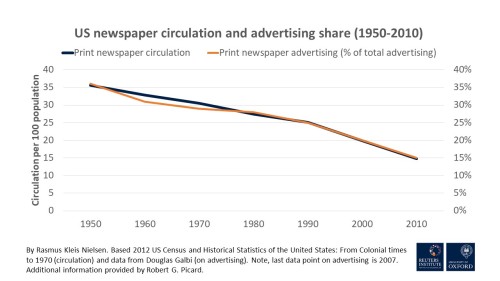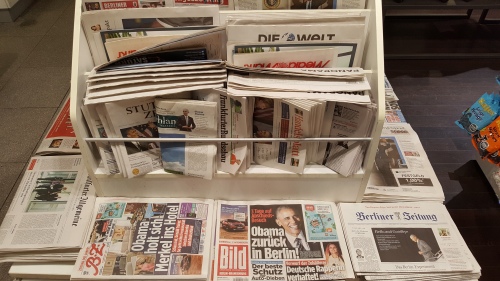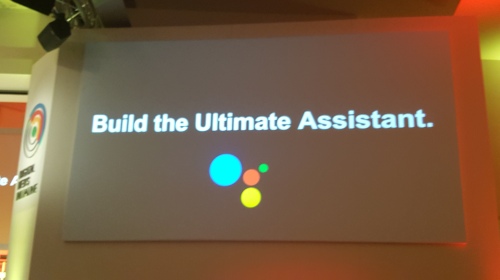
October 10-12 2018, the Reuters Institute for the Study of Journalism at the University of Oxford will host the fourth International Journal of Press/Politics conference, focused on academic research on the relation between media and political processes around the world. (See the program from the 2015 conference, the 2016 conference, and the 2017 conference.)
A selection of the best full papers presented at the conference will be published in the journal after peer review. The deadline for submission of abstracts is June 15 2018. Attendees will be notified of acceptance by June 29 2018.
Professor Andrew Chadwick from Loughborough University will deliver a keynote lecture.
The conference brings together scholars doing internationally-oriented or comparative research on the intersection between news media and politics around the world. It aims to provide a forum for academics from a wide range of different disciplines and countries to discuss the theoretical, methodological, and substantial challenges and opportunities for research in this area. It is open to work from political science, political communication, journalism studies, media and communications research, computational social science, and many other fields.
Examples of relevant topics include the political implications of current changes in the media, the relative importance of new forms of digital media for engaging with news and politics, studies of the role of entertainment and popular culture in how people follow current affairs, studies of relations between political actors and journalists, research on political communication beyond the electoral context (including of government, interest groups, and social movements), all with a particular interest in studies that focus on parts of the world that are under-researched in the international English language academic literature, develop comparative approaches, or represent substantial theoretical or methodological advances.
Titles and abstracts for papers (250 words max) are invited by June 15 2018. The abstract should clearly describe the key question, the theoretical and methodological approach, the evidence the argument is based on, as well as its wider implication of international relevance.
Please send submissions to the email address ijpp@politics.ox.ac.uk with the subject line “IJPP conference submission” including in the email the full title of your paper, the abstract, and your name and professional affiliation. (Please do not send attachments.) Full papers based on accepted abstracts will be due Friday September 14, 2018.
The conference is organized by Rasmus Kleis Nielsen (RISJ Director of Research and IJPP Editor-in-Chief) and Cristian Vaccari (Loughborough University). Please contact Rasmus Kleis Nielsen with questions at rasmus.nielsen@politics.ox.ac.uk.
More about the journal, the Reuters Institute, and the keynote speaker:
The International Journal of Press/Politics
IJPP is an interdisciplinary journal for the analysis and discussion of the role of the press and politics in a globalized world. The journal publishes theoretical and empirical research which analyzes the linkages between the news media and political processes and actors around the world, emphasizes international and comparative work, and links research in the fields of political communication and journalism studies, and the disciplines of political science and media and communication.
Keynote Speaker – Andrew Chadwick
Andrew Chadwick (PhD London School of Economics, FRSA) is Professor of Political Communication at Loughborough University, where he leads the Doctoral Training Centre in Online Civic Culture and is a member of the Centre for Research in Communication and Culture. His books include The Hybrid Media System: Politics and Power (Oxford University Press, 2013; Second Edition, 2017), which won the 2016 International Journal of Press/Politics Book Award for an outstanding book on media and politics published in the previous ten years and the American Political Science Association Information Technology and Politics Section Best Book Award, 2014; as well as The Handbook of Internet Politics, co-edited with Philip N. Howard (Routledge 2009), and Internet Politics: States, Citizens, and New Communication Technologies (Oxford University Press, 2006), which won the American Sociological Association Best Book Award (Communication and Information Technologies Section). Professor Chadwick is also the editor of the Oxford University Press book series Oxford Studies in Digital Politics and was a founding Associate Editor of the Journal of Information Technology and Politics and continues as a Senior Editorial Board member for the journal. He also serves on the editorial board of the International Journal of Press/Politics and Social Media and Society.
The Reuters Institute for the Study of Journalism
The Reuters Institute for the Study of Journalism marks the University of Oxford’s commitment to the comparative study of journalism around the world. Anchored in the recognition of the key role of independent media in open societies and the power of information in the modern world, the institute aims to serve as the leading forum for a productive engagement between scholars from a wide range of disciplines and practitioners of journalism. It brings the depth and rigor of academic scholarship of the highest standards to major issues of relevance to the world of news media. It is global in its perspective and in the content of its activities.



 So proud of the very strong line-up of Reuters Institute papers and participants for 2017 ICA in San Diego.
So proud of the very strong line-up of Reuters Institute papers and participants for 2017 ICA in San Diego.




